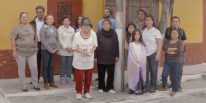Guapo’y
(Guapo'y)
Sofía Paola Thorne / Argentina, Paraguay, Qatar / 2022 / 70 min





IDFA Int'l Documentary Film Festival Amsterdam
Special Mention Best First FeatureMálaga Film Festival
Best DirectorUruguay Int'l Film Festival
Human Rights Best Film, Audience AwardTrue/False Festival
Festival de Biárritz Amérique Latine
Pricing
Related Films
 Fearless(Sin Miedo)Claudio ZulianA group of relatives of people disappeared during the Guatemalan military dictatorship requested and obtained, among many other measures of compensation, ...
Fearless(Sin Miedo)Claudio ZulianA group of relatives of people disappeared during the Guatemalan military dictatorship requested and obtained, among many other measures of compensation, ... The Offended(Los Ofendidos)Marcela ZamoraAn award-winning documentary on the legacy of the internal armed conflict in El Salvador, The Offended features the director’s charismatic father, ...
The Offended(Los Ofendidos)Marcela ZamoraAn award-winning documentary on the legacy of the internal armed conflict in El Salvador, The Offended features the director’s charismatic father, ... Indigo(Añil)Julio López FernándezIn this powerful hybrid documentary, filmmaker Julio López Fernández weaves together the testimonies of women who endured sexual violence during the ...
Indigo(Añil)Julio López FernándezIn this powerful hybrid documentary, filmmaker Julio López Fernández weaves together the testimonies of women who endured sexual violence during the ... The Film Justifies the Means(El film justifica los medios)Juan Jacobo del CastilloInside our dark editing rooms, we unearth images filmed by a generation of filmmakers who dared to capture the raw, unfiltered reality of a country in ...
The Film Justifies the Means(El film justifica los medios)Juan Jacobo del CastilloInside our dark editing rooms, we unearth images filmed by a generation of filmmakers who dared to capture the raw, unfiltered reality of a country in ... El Eternauta’s Wife(La mujer de El Eternauta)Adan AliagaIt has been fifty years since the adventures of Juan Salvo were first published in the science fiction comic El Eternauta. Some time in 1957, Argentine ...
El Eternauta’s Wife(La mujer de El Eternauta)Adan AliagaIt has been fifty years since the adventures of Juan Salvo were first published in the science fiction comic El Eternauta. Some time in 1957, Argentine ...Synopsis
Spanish, Guarani, and indigenous languages with English subtitles
With Celsa Ramírez Rodas, María Lina Rodas, Derlis Villagra
Alfredo Stroessner ruled Paraguay with an iron fist from 1954 to 1989, making him the longest-serving dictator in South America. During his regime, authorities imprisoned, tortured, and killed countless opponents, creating an atmosphere of fear and oppression.
In Sofía Paoli Thorne’s documentary Guapo’y, we meet Celsa, a 70-year-old woman who bravely revisits this dark chapter of Paraguayan history. Forty-five years ago, while pregnant with her son, Celsa endured imprisonment and torture. Tragically, she later discovered that authorities had tortured and murdered her husband as well. After spending eight years apart, Celsa finally reunited with her mother, who had also suffered imprisonment. Together, these two women reflect on their traumatic experiences, finding solace in each other’s company. Meanwhile, the lush beauty of nature—especially the herbs Celsa carefully gathers—offers a sharp contrast to her painful memories.
The horrors of the past continue to haunt the present. When someone discovers what may be her husband’s remains beneath a house once owned by Stroessner, Celsa faces her trauma all over again. Disturbingly, the current president, Mario Abdo Benítez, who is the grandson of Stroessner’s personal secretary, openly praises the former dictator’s policies. This unsettling connection reminds viewers that the legacy of dictatorship still casts a long shadow over Paraguay.
Related Subjects
About the Director
Sofía Paoli Thorne was born in Peru and moved to Paraguay with her whole family in 1989 escaping the armed conflicts between the military and the rebels groups. There, she became a director and a producer in IPAC with a postgraduate degree in business administration from Universidad Pacifico.
She founded Tekoha Audiovisual where she made different audiovisual pieces for television, documentary films, and NGOs videos. Paoli Thorne was the director of the TV show Tembi’u rape, awarded for its innovation in the TAL awards. She is the producer of La afinación del diablo (The Devil’s Tuning), winner of Ibermedia’s DocTv Latinoamerica VI, and participated at IDFA (Netherlands), FIDBA (Argentina), and FESTLATINOSP (Brazil). She produced Fuera de campo (Out of Field), directed by Hugo Giménez, winner of DocTv and premiered at the Guadalajara International Film Festival.
Her first documentary film as a director, Guapo’y, was awarded a special mention in the Best First Film Category at IDFA.
Press
“These vivid stories are heartbreaking, yet Thorne also juxtaposes them with the calm rhythm of Celsa’s daily life, where she carefully tends to her plants and gathers ingredients for herbal cures. Against all odds, the healing has begun.” – Phuong Le, The Guardian
“Through Celsa's story [Sofía Paoli Thorne] shows us how the past can profoundly influence our lives, and how healing and justice go hand in hand.” – Emiliano Basile, Escribiendo Cine
“An important audiovisual testimony of resilience that originated from a very hard moment in the conflictive history of South America.” – Gianmarco Farfán, Cineencuentro
“The product of nine years of visits and conversations about children, grandchildren, and plants, the documentary portrays fragments of Ramírez's life and his memories of the Emboscada prison.” – EFE
Notes on the Film
“I felt that I needed to do something to make the history of the dictatorship known. It made me quite uncomfortable to hear people say, ‘that’s already happened, we have to look forward’. It was something that they said not only in political speeches, but also in my friends and that idea is reflected in the entire process of the country because the places that should be museums or tell history through education –I went to school in Paraguay– do not speak of the subject and the Ambush is currently a maximum security prison, it is not a place of memory, very little is said about the dictatorship. It seemed to me that it was important that what Celsa was experiencing could also be told, which is not part of the past. The things that one suffers impact your body and it is something that we constantly experience, it is not easily forgotten, you cannot simply leave it behind, it is a matter of memory to not repeat the same mistakes, and I always felt that it was preferable not to talk.”
– Sofia Paoli Thorne, Director